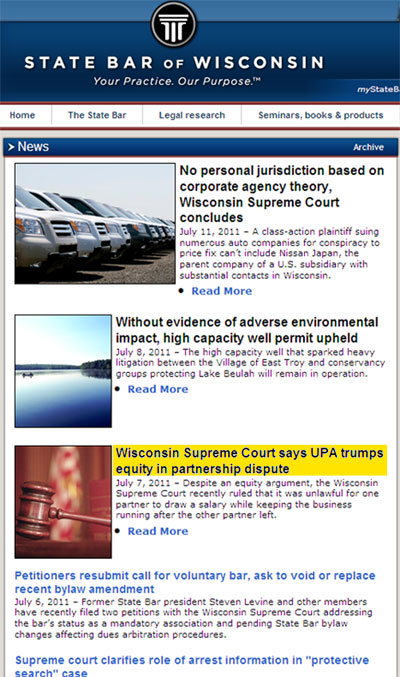Lommen attorneys Thomas Jacobson, Kay Hunt and Diane Odeen successfully represented David Bushard before the Wisconsin Supreme Court in a case that dealt with the breakup of a partnership.
 In 1995, Bushard and Steven Reisman formed PressEnter, a partnership that provided internet dial-up services to communities in western Wisconsin. The business flourished, but the friendship did not, and in 1999, Bushard sent a letter to Reisman asking to dissolve the partnership and wind up the business.
In 1995, Bushard and Steven Reisman formed PressEnter, a partnership that provided internet dial-up services to communities in western Wisconsin. The business flourished, but the friendship did not, and in 1999, Bushard sent a letter to Reisman asking to dissolve the partnership and wind up the business.
But instead of selling the business – or buying out Bushard – Reisman kept operating PressEnter. Bushard continued to receive regular partnership draws, in what he thought was the same amount as Reisman was receiving. But Reisman began to take a salary in 2004 without notifying Bushard – and in violation of applicable partnership law. Bushard eventually found out and sued Reisman and PressEnter, alleging breach of fiduciary duty and unjust enrichment, and seeking an accounting of the partnership’s finances. Reisman counterclaimed, alleging that Bushard had damaged the business’s reputation and had been unjustly enriched by accepting his partnership draw without participating in the partnership business.
The question before the Pierce County Circuit Court was how PressEnter’s assets should be divided between the two partners. Because there was no written partnership agreement, the dispute was governed by the Uniform Partnership Act (“UPA”), originally written in 1914, which prevented Reisman from unilaterally taking a salary. Bushard argued that the law was clear; Reisman argued that it wasn’t fair that he ran the business but received the same draw as Bushard.
The circuit court sided with Bushard and ordered Reisman to reimburse the business for the salary he had taken. It also awarded summary judgment to Bushard and ordered that the wind up of PressEnter’s affairs be completed. Reisman appealed to the Wisconsin Court of Appeals, which affirmed the circuit court. Reisman then appealed to the Wisconsin Supreme Court, arguing that the circuit court failed to properly determine whether the business was in wind-up mode, and failed to properly apply equitable principles and allow additional compensation to Reisman.
The Wisconsin Supreme Court held that the plain language of the statute barred any of the remedies sought by Reisman. Since Bushard was still alive, the statutory language allowing the “surviving partner” to be paid for his work at winding up the business did not apply. Nor did the statute’s plain language allow Reisman to unilaterally take a salary. Bushard was not unjustly enriched because he was statutorily entitled to half of the partnership profits. And finally, there was no factual dispute that the dissolution of PressEnter resulted in a wind-up rather than a continuation.
The Supreme Court noted that the result could have been different if Reisman and Bushard had a written agreement with different terms for dissolving the partnership. But since there was no written agreement, the parties were bound by the UPA, which required that all partnership profits be shared equally until it was finally wound up.
The moral of the story? Partners have significant fiduciary duties to each other, and if the partnership agreement is not in writing, state law applies. This may result in some unintended consequences when one partner wants to wind up the business and the other does not. Even before they begin, business partners should seek legal advice to determine and document how they want the partnership to end.
Get more information:
- Read the State Bar of Wisconsin article, or
- Review the decision: Bushard v. Reisman, Wisconsin Supreme Court, June 30, 2011.
